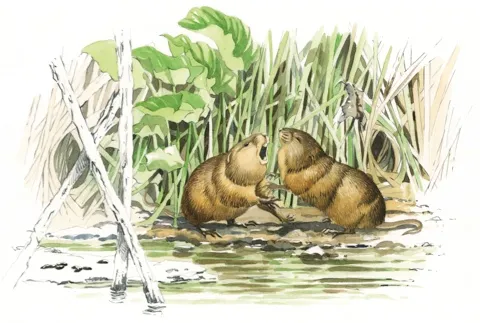Discover all you need to know about water voles.
Water voles are widespread in the UK, though populations have declined dramatically.
They are out and about on rivers and canals throughout the day, especially if brown rats live nearby because the latter are most active at night.
Look for ‘runways’ through riverside vegetation, and burrow entrances at or just above the water’s edge.
On the scent
In the breeding season from March to September, there are a range of behaviours to look out for.
Water voles have large scent glands on their flanks, which they scratch with their hind feet at latrines – piles of faeces that mark their territory – to release and spread their scent.
They also scent-mark during aggressive and sexual encounters.

In summer, if you see two water voles boxing or rolling around trying to bite each other, it could be a mother telling her daughter that it’s time to move out. © Federico Gemma
Female fury
Both males and females fight, though combat between males is generally more aggressive.
Females often start fights by chattering their teeth, scratching the scent glands on their flanks and beating the ground with their tails.
Between May and October, you may well see mothers attacking their female offspring to expel them from their territory – the youngsters can suffer severe bite wounds in the battle.
Harvest time
Water voles need to eat 80 per cent of their body weight each day, so they spend a lot of their time sitting on their haunches munching. But feeding is usually done in dense cover, so it can be hard to spot.
They normally eat only the nodes on grasses (the points where the leaves emerge from the stems).
In the autumn, you may see them carrying plant material to their burrows as food for the winter.
Next month look out for how to understand fox cub behaviour...
Find out more about the work of illustrator Federico Gemma.
Click here to read other understand mammal behaviour articles.
